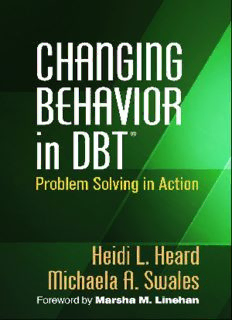Table Of ContentChanging Behavior in DBT®
Changing
Behavior
in DBT
®
Problem Solving in action
heidi L. heard
Michaela a. Swales
Foreword by Marsha M. Linehan
The Guilford Press
new York London
© 2016 The Guilford Press
A Division of Guilford Publications, Inc.
370 Seventh Avenue, Suite 1200, New York, NY 10001
www.guilford.com
All rights reserved
No part of this book may be reproduced, translated, stored in
a retrieval system, or transmitted, in any form or by any means,
electronic, mechanical, photocopying, microfilming, recording,
or otherwise, without written permission from the publisher.
Printed in the United States of America
This book is printed on acid-free paper.
Last digit is print number: 9 8 7 6 5 4 3 2 1
The authors have checked with sources believed to be reliable in their
efforts to provide information that is complete and generally in accord
with the standards of practice that are accepted at the time of publication.
However, in view of the possibility of human error or changes in behavioral,
mental health, or medical sciences, neither the authors, nor the editors and
publisher, nor any other party who has been involved in the preparation or
publication of this work warrants that the information contained herein is
in every respect accurate or complete, and they are not responsible for any
errors or omissions or the results obtained from the use of such information.
Readers are encouraged to confirm the information contained in this book
with other sources.
Library of Congress Cataloging-in-Publication Data
is available from the publisher.
ISBN 978-1-4625-2264-4
DBT is a registered trademark of Marsha M. Linehan.
For those family and friends who provided
abundant support throughout this project
—H. L. H.
For Richard, Thomas, and Caitlin
—M. A. S.
aBouT The auThorS
Heidi L. Heard, PhD, is a Senior Trainer for Behavioral Tech, which
provides advanced training in DBT, and Clinical Instructor at the Uni-
versity of Washington in Seattle. Based in St. Louis, she is the founder
and former director of British Isles DBT Training and provides consulta-
tion to DBT therapists and teams in North America and Europe. After
collaborating with Marsha M. Linehan on the initial outcome trials for
standard DBT and the adaptation for substance abuse and dependence,
Dr. Heard has focused her research on the cost-effectiveness of DBT.
She has published numerous articles and chapters related to borderline
personality disorder and DBT and is coauthor (with Michaela A. Swales)
of Dialectical Behaviour Therapy: Distinctive Features.
Michaela A. Swales, PhD, is a Consultant Clinical Psychologist with Betsi
Cadwaladr University Health Board, the largest health organization in
Wales, and Senior Lecturer at the North Wales Clinical Psychology Pro-
gramme, School of Psychology, Bangor University. She is also Director of
British Isles DBT Training. Dr. Swales has trained more than a thousand
professionals in DBT, seeding over 350 programs. Her research interests
are primarily in the effective implementation of evidence-based psycho-
logical therapies in routine clinical practice; she is currently involved
in a clinical trial of DBT for treatment-resistant depression. Dr. Swales
is a participant in the Working Group on Classification of Personality
Disorders that reports to the World Health Organization’s International
Advisory Group for the revision of the ICD-10 classification of mental
and behavioral disorders.
vii
ForeworD
h
eidi Heard and Michaela Swales first met at one of my early inten-
sive trainings in Seattle in the early 1990s. Heidi was then my graduate
student; having been closely involved in the first randomized controlled
trial of DBT, she was developing her skills as a trainer in DBT alongside
me. Michaela was part of the first U.K. team to learn DBT. Inspired by
her mentor, Mark Williams, who later went on to develop mindfulness-
based cognitive therapy with John Teasdale and Zindel Segal, she had
come to Seattle to learn how to treat adolescents with suicidal and self-
harm behaviors. Heidi and Michaela’s meeting was to prove auspicious
for the dissemination of DBT outside the United States. They gave a
presentation together at a conference in Dublin the following year, and
during their visit there, they hatched the plan that would take Heidi to
work alongside Michaela and Mark Williams in North Wales.
During Heidi’s time in the United Kingdom, she used her already
considerable skills and expertise to found the British Isles DBT Training
Team, which Michaela would go on to lead. Together they have crossed
the length and breadth of the United Kingdom and Ireland to train
mental health professionals in DBT, eventually developing a national
training team that delivers high-quality training in DBT throughout the
British Isles, in partnership with the Linehan Institute. Their skills in
mentoring trainers to achieve similar levels of precision and clarity in
the conceptualization and treatment of clients’ problems have informed
the development of our own U.S. mentorship program for DBT trainers.
As well as being adherent and highly competent therapists them-
selves, Heidi and Michaela have developed a wealth and breadth of
knowledge both in training therapists and developing their skills toward
ix
Description:This book delves into problem solving, one of the core components of dialectical behavior therapy (DBT). The authors are leading DBT trainers who elucidate the therapy's principles of behavior change and use case examples to illustrate their effective application. Particular attention is given to co

